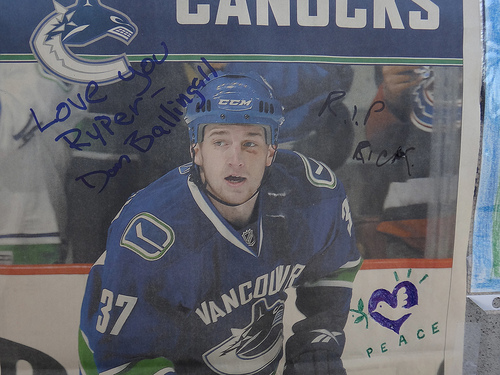By Joel Smart (The Cascade) – Email
Date Posted: August 31, 2011
Print Edition: August 25, 2011
In recent years, much has been made of the violence that fans have long adored and defended as an integral part of the hockey experience. Critics have called it barbaric and unnecessarily dangerous, but most hockey fans ignore their calls for increased safety measures, largely because of fears that it would dampen the intensity level of a game arguably in a class of its own among major sports. The recent deaths of two young professional NHL players, Derek Boogaard in May 2011 and now Rick Rypien, both known for their ability to fight, have strengthened the cause of critics of violence. That said, Rick Rypien’s death in particular carries with it a new lesson that fans of the sport may want to keep in mind.
It is well documented that Rypien had long struggled with personal issues and inner demons that forced him to take several leaves of absence from his NHL career. After his death, the Winnipeg Jets assistant manager Craig Heisinger confirmed with Global News that Rypien had been suffering from depression for over a decade. According to a letter published in The Province, he was also dealing with anger issues – a claim seemingly backed-up by an incident where he grabbed a fan in the stands after being kicked out of a game for violent behavior, which occurred just before his final leave of absence.
As a fan of hockey fights, it can be easy to forget just how real the combatants are. Within the context of a hockey game, a good fight can change the momentum and inspire teammates to play harder. It is especially exciting for fans to see just how much their team wants to win, and it gives them bragging rights over the opposition. For some fans, the game of hockey is full-out war, and what better way to crush the enemy than with an old-fashioned brawl. However, concussions, head-shots and broken vertebrae have brought light to the issue, and caused us to realize that our players are not immortal. What Rypien’s death adds to that equation is the realization that these players are human, not just physically, but mentally as well.
Perhaps we are sometimes guilty of treating professional athletes the way we treat other celebrities, as though they can handle any and all criticism and any of the challenges we want them to face. But in light of recent events, questions must be asked about any possible role hockey (and his job as an enforcer) could have played in Rypien’s depression. Considering hockey players are usually taught from a young age to play the game, what role could the encouragement of coaches to accept a role as an enforcer have played on his psyche? What about the pressure to fight from thousands of fans?
We will likely never know if hockey played any role, but as we celebrate the game and eventually put our own children into skates, hopefully the loss of Rick Rypien will help us remember that mental health always comes first. He spent six seasons with the Canucks organization and was just 27-years-old when he died. Rest in Peace, Rick Rypien – may your memory live on.


